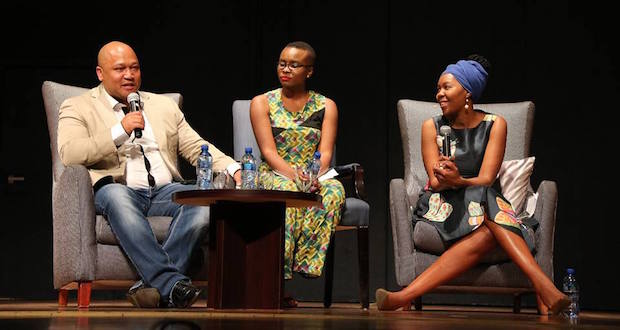Ruth First Fellows Panashe Chigumadzi and Sisonke Msimang speak on race relations in South Africa.
Speaking to an audience of close to a thousand in the Wits Great Hall, Panashe Chigumadzi and Sisonke Msimang, the two Ruth First fellows, reflected on their research around the theme: “Race: Lived Experiences and Contemporary Conversations”.
Chigumadzi, 23, the founder and editor of Vanguard Magazine, presented her work which explored the concept of a “coconut”. “Coconut experiences are not new,” added Chigumadzi, “Tiyo Soga (a South African journalist and minister from the 1800s), might have been the first black coconut.” In unpacking the term, Chigumadzi said a “coconut” is an “experience of socialisation which leads to a knowledge of white grammar.” Despite the many negative connotations attached to the term, Chigumadzi believes “coconuts” can achieve black consciousness.
For Chigumadzi, also a Wits postgraduate student, the language of black consciousness and critical race theory helps to empower “coconuts” to speak back to racism. “Coconuts” have not been coopted as a white buffer but are joining the Black working class in struggle against racism, she explained.
Presenting her research on “interracial friendships”, Msimang choose the mechanism of performance to deliver her findings. In collaboration with celebrated artist Lebo Mashile, Msimang reflected on the nuances of race relations in South Africa. Incorporating racialised headline news stories such as Riaan Malan’s admission to sex with a domestic worker to the incident of “black face” at the University of Pretoria, the entertaining performance probed the serious topic of “interracial friendships.”
Their piece ended on a less than promising note with the conclusion, “with friends like these, who needs enemies?”. A discussion, moderated by political commentator and author, Eusebius McKaiser, saw a number of mixed responses and questions from the audience. One person questioned why the event was named after Ruth First and not Robert Sobukwe. Another criticised the speakers, asking how long were they planning to be “victims”. Several audience members recounted their own experiences of Blackness and their difficulties in negotiating the issue of race in South Africa.
The event, commemorating the life of journalist and activist Ruth First, who was killed by a letter bomb on this day in 1982, opened with an address by a scholar from Jeppe High School which First attended as a child.
PANASHE CHIGUMADZI LECTURE
SISONKE MSIMANG LECTURE





2 responses to “South Africa’s Ruth First Fellows & The Rainbow Nation”
Its interesting to get different perspectives about rcace in South Africa.
i am excited about young voices in South Africa bringing attention to race in the post apartheid era